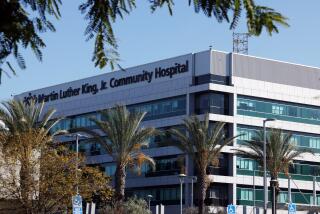White, Black Nashville Hospitals Worlds Apart : Merger Plan Meets Opposition; Racism Seen as Chief Cause
- Share via
NASHVILLE — On one side of this capital city sits Hubbard Hospital, a gleaming 400-bed facility managed by historically black Meharry Medical School. The 11-story hospital, built 13 years ago, is struggling to find enough patients to fill its beds and clinic. It is so under-utilized that two whole floors are empty. Without enough patients to train its physicians, Meharry, a school that has produced nearly four of every 10 black doctors and dentists in the nation, could quickly go under.
On the other side of town is much smaller Metro General Hospital, an aging brick structure next to the Cumberland River. The city-owned facility is so severely overcrowded that patients sometimes wait 10 weeks for an appointment to the clinic and doctors must meet in the corridors to discuss cases. Metro General, parts of which are 50 years old, needs a new clinic immediately and a new hospital building within the next few years at an estimated cost of more than $65 million.
Merger Proposed
Why not, Meharry proposed, merge the two facilities at Hubbard? That would provide the city with a spacious, modern facility while providing Meharry with enough patients for its teaching institution. The $12-million city subsidy Meharry would inherit would place the institution on firm financial footing.
The local Chamber of Commerce favors the idea. So does Vanderbilt University, which now provides medical care to patients at Metro General. Even Louis W. Sullivan, secretary of Health and Human Services, has given it a tacit nod. And recently, a task force from the city’s hospital board, which governs Metro General, said after eight months of study that the plan makes sense.
But the merger may never happen. A surprising amount of opposition to the proposal has appeared. Some employees at both hospitals have come out against it. Hospital board members who have never disagreed on an issue are finding themselves suddenly at odds.
Opponents of the merger voice a number of legitimate concerns, but increasingly, those observing the debate say, the underlying question is race.
“There is racism on both sides of this track,” said David Satcher, president of Meharry. “There are whites and blacks who don’t want this to go through, but when you’re talking about the future of this city, you’ve got to overcome that.”
As a result of the brewing debate, the plan to aid the two struggling institutions has become a referendum on this city’s ability to overcome a history of separation and negative racial attitudes.
If the merger is approved, the mostly white administrative staff of Metro General will have the same responsibilities at the new hospital, but Meharry doctors will be in charge of health care for present city hospital patients, who are 60% white and largely poor. Some people feel uncomfortable with that, officials said.
“There’s a strong current, against all reason, which opposes this,” said Dr. Jefferson Pennington, chairman of the city hospital board’s task force. “There are people who simply don’t want to see change. I almost feel they’d rather destroy the hospital than change it.”
If the proposal is rejected, it will probably ring the death knell for Meharry.
On the surface, the arguments regarding the merger reflect the questions that normally accompany such plans, whether the idea is financially feasible and whether the quality of medical care will be maintained.
While Meharry claims the merger would save the city $2.3 million yearly, officials at Metro General said it would cost money instead. Metro General Hospital director John Stone, a staunch opponent of the plan, said his figures show that the merger would increase costs by $4.9 million in the first year and by $2.5 million in the third year.
‘Not Something We Need’
“We’re not interested in merging,” said Stone, who is sure he can beat back the proposal. “It’s not something we need, and it’s not something we want.”
Then there are questions of the quality of care. At present, most of the medical care at Metro General is provided by Vanderbilt, one of the most respected medical schools in the country. While a number of members of Meharry’s staff are highly regarded, the school presently does not have the number or caliber of physicians to handle the patient load it will inherit under the merger.
Vanderbilt, however, has announced that it will aid Meharry in the transition, staying on to provide certain services and help the institution recruit respected physicians to build departments.
“We believe firmly that a strong and self-sufficient Meharry Medical College will benefit everybody in this area and the nation as a whole,” said Eugene Fowinkle, Vanderbilt’s associate vice chancellor for health affairs. “We think the enterprise of their building their parent hospital up while serving the indigent population is a noble and worthy effort.”
Beyond the medical questions are questions of perception. Some residents--both black and white--labor under the racist stereotype that black doctors are inherently inferior.
“There are some blacks who don’t want to go to Meharry,” Fowinkle said. “They say there are two types of medicine, black medicine and white medicine. And they believe white medicine is better.”
“It’s the old axiom of the white man’s ice is colder than the black man’s ice,” Satcher said.
Though the neighborhood surrounding Meharry-Hubbard does not have a greater crime problem than other areas of the city, some whites, particularly hospital employees, have expressed concern about going into a predominately black neighborhood.
“Metro General sits on the river where all the homeless people gather,” said Dr. Nat Winston, a city hospital board member. “I feel safer going to Meharry than going over there.” After looking at those issues, four of the seven hospital board members concluded that the plan would save money and that Meharry could put together the hospital staff to adequately manage the hospital.
“The beauty is that Meharry’s mission and those of General Hospital are the same, to serve the under-served.” Pennington, the hospital board task force chairman, said.
At first, the plan appeared to be sailing through. But almost as soon as the task force recommended that the board proceed with the proposal, other board members voted that it be tabled.
“I could barely finish reading the recommendation,” Pennington said.
Despite their own task force’s examination of the figures, some hospital board members said they still are not sure about the financial feasibility and requested that an additional outside accounting firm look at the figures, something Meharry had suggested five months ago.
That will delay a decision at least another two months. And despite Vanderbilt’s promise to work with Meharry, other board members said they are still not comfortable with the plan.
“I’m not sure exactly what Vanderbilt is going to do,” said Jean Vakesnoris, a nurse and board member. “I think we need more proof of the quality of people who will handle our patient load.”
Satcher said that when he sees such responses, he begins to believe all of the agenda is not on the table.
“I have never said race was the only issue, but it is certainly there,” Satcher said. “We have put into writing all of the other issues. We have looked at service, staffing, feasibility. But when somebody comes up with five different sets of figures, you start seeing that race has something to do with it. Race tends to get in the way of a frank discussion of other issues.”
Meharry’s relationship with the larger community has always been somewhat strained. For instance, the city hospital board refused to approve a teaching arrangement at Metro General for Meharry doctors until four years ago. That was 92 years after the initial request was made.
In recognition of the historical inequities under which the school had functioned, President Ronald Reagan in 1982 forgave the final $29 million of the federal loan that the school used to build the hospital.
Despite the recent delays, Satcher is optimistic that the plan will go through, but not without some soul searching by the city.
“We won’t be able to resolve this issue until we overcome the historic relationship between the city of Nashville and Meharry, a relationship that has been primarily based on race and exclusion,” Satcher said.
More to Read
Sign up for Essential California
The most important California stories and recommendations in your inbox every morning.
You may occasionally receive promotional content from the Los Angeles Times.













